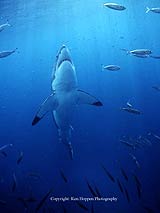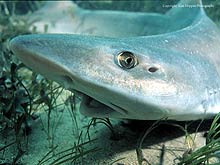For example, the great white shark has a large number of marine mammals in its diet making it a very high level predator, whereas the zebra shark (Stegostoma fasciatum) feeds only on molluscs and so is considered to be a lower level predator.
Removal of top-level predators can cause a ‘top-down’ effect on organisms lower in the food webs. This has been clearly demonstrated in some parts of the oceans where a predator’s population was reduced so much that the population of the main prey began to explode. Because there were then so many of the prey they began to eat themselves out of food, changing the ecology of the whole area. It is very difficult to determine what the effect of shark extinction might be on marine ecosystems because it is very difficult to conduct the research needed to find out. However, it is thought that, for example, if the great white shark were to become extinct there might be a population explosion of seals, sea lions, small cetaceans and other shark species, as these are its main prey.
Conclusion
Our current understanding suggests that the role of high level predators is important in maintaining the ecosystem and their removal will have unknown effects on the remaining animals and plants. Further study is needed to understand both the biology of various sharks and the way their habitats work.
In short, a shark's role…… ?
To eat (and be eaten).
Alex Gaut adapted this information sheet for children (which is suitable for primary school students) from the information sheet compiled for the general public by © Mike Bennett (m.bennett@ uq.edu.au).
This information sheet may be copied for educational purposes. For any other purpose please contact your State MESA representative: http://www.mesa.edu.au/council/contacts.asp
|

The great white shark (Carcharodon carcharias)
has the highest trophic level (4.5) due primarily
to marine mammals making up about
20% of its diet.
(© Ken Hoppen, oceannotions@primus.com.au)

Gummy sharks ( Mustelus antarcticus ) are
a principal target in the southern fisheries
off the coasts of New South Wales, South
Australia, Tasmanian, Victoria and
Western Australia.
(© Ken Hoppen, oceannotions@primus.com.au)
|
